Imagine you need to hire a personal assistant, but you can’t find one. No worries – there’s no need to spend much time searching. You can still have one powered by AI.
Just like an actual human, it can manage schedules, automate tasks, retrieve information, assist in communication, plan travel, control smart home devices, take notes, track health and fitness, offer entertainment recommendations, provide financial advice, manage social media, and even offer emotional support – all to make your life more convenient and efficient.
Isn’t it fantastic? Welcome to the future of productivity and convenience! In today’s article, we will talk about autonomous AI agents and how they can optimize our daily business routine tasks.
What is an AI agent in artificial intelligence?
Autonomous AI agents generally refer to AI systems that operate independently, making decisions and taking actions without constant human intervention. These agents are designed to learn from their environment, adapt to changes, and perform tasks autonomously.
Agents can be both physical entities, such as robots or autonomous vehicles, and virtual entities, like software programs or algorithms.
Autonomous AI agents typically possess the following characteristics:
- Autonomy: They can operate and make decisions independently based on their programming and learning from data.
- Learning capability: These agents often incorporate machine learning algorithms, allowing them to improve their performance over time through experience and exposure to new data.
- Adaptability: Autonomous AI agents can adapt to changes in their environment or task requirements without requiring manual reprogramming.
- Decision-making: They can make decisions, sometimes even complex ones, based on their understanding of the situation and objectives.
- Interaction: Some autonomous agents may interact with their environment or other agents to achieve specific goals.
How do autonomous agents work?
You might be thinking: “Wow, what an incredible technology! But how exactly does it work?” Let’s break it down.
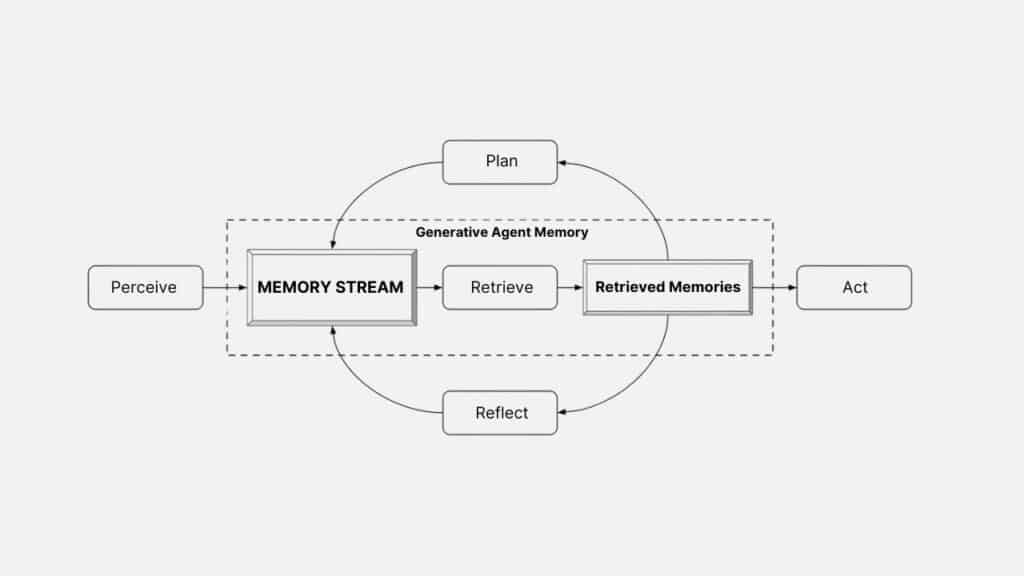
Autonomous AI agents work through a combination of algorithms, data, and learning processes to perform tasks and make decisions without constant human intervention. Here’s a general overview of how autonomous AI agents work:
Data collection
Autonomous AI agents rely on data to learn and make informed decisions. This data can be historical information, real-time sensor data, or other relevant inputs.
Algorithms and models
Machine learning algorithms and models are at the core of autonomous AI agents. These algorithms help the agent to analyze and interpret data, identify patterns, and make predictions or decisions.
Training
During the training phase, the AI agent is exposed to labeled data, where the correct outcomes are known. The agent adjusts its internal parameters (for example, weights in a neural network) to minimize the difference between its predictions and the actual outcomes.
Learning
Autonomous AI agents often can learn from experience. They can adapt their models and behavior to improve performance over time as they encounter new data or situations.
Decision-making
Once trained, the AI agent can make decisions based on its understanding of the input data and the patterns it has learned. The decision-making process is guided by the objectives programmed into the agent or learned from the data.
What are the benefits of autonomous AI?
Now that we have an understanding of what autonomous AI agents are and how they work, let’s explore how these intelligent systems can significantly improve efficiency in our daily business operations, and believe us, they really can.
Workflow optimization
Of course, the first and foremost benefit is that autonomous AI agents optimize the workflow, they streamline and refine operational processes. Through their adept automation of routine tasks and intelligent analysis of data patterns, these agents identify bottlenecks and inefficiencies, contributing to a more efficient and effective workflow.
Their ability to prioritize tasks, allocate resources optimally, and offer real-time insights ensures businesses operate at peak performance. With the precision and speed of AI, workflow optimization becomes a dynamic and continuous enhancement, allowing organizations to adapt swiftly to changing demands and maintain a competitive edge.
Automation of repetitive tasks
Imagine having a helper that takes care of all those repetitive tasks you do every day, for instance, data entry, report generation, email responses, social media posting, customer queries, inventory management, and so much more. By automating repetitive tasks, autonomous AI agents save people’s time, ensure things get done smoothly, and allow people to focus on more critical and creative parts of their work.
Reducing errors
AI agents excel at reducing errors in daily business operations through automated data handling, error detection algorithms, and real-time monitoring. Their consistent decision-making and adaptive learning minimize the risk of mistakes, ensuring accurate and reliable workflows.
Saving time
As AI agents automate repetitive tasks from data entry to complex business processes and reduce the risk of errors, they make the workflow process faster and more efficient, saving people time.
Predictive analytics
Predictive analytics, powered by AI agents, revolutionizes decision-making and resource planning by analyzing data patterns and trends. These agents use historical data to forecast future outcomes, allowing businesses to anticipate shifts in demand, identify potential opportunities, and even address challenges.
For instance, an e-commerce company employing predictive analytics through AI agents may analyze past purchasing behavior, seasonal trends, and customer preferences. This analysis could forecast which products will likely be in high demand during specific periods. With this foresight, the company can manage inventory, plan targeted marketing campaigns, and optimize resources to meet anticipated customer needs, improving operational efficiency and customer satisfaction.
Customer support
Autonomous AI agents help customer support by offering instant, 24/7 assistance, efficiently handling queries, and ensuring consistent service. With the ability to process information rapidly, these agents provide quick and accurate responses, freeing up human support teams to focus on more complex issues.
Multilingual support, data-driven insights, and personalized interactions improve the customer experience.
Document management
Managing documents is super easy with AI agents. They help organize and sort many documents so you can quickly find what you need. These intelligent systems understand the content of documents, making it easy to search and manage them. They also help teams work together better by controlling who can access what and keeping everything up to date.
Top 5 AI agents examples
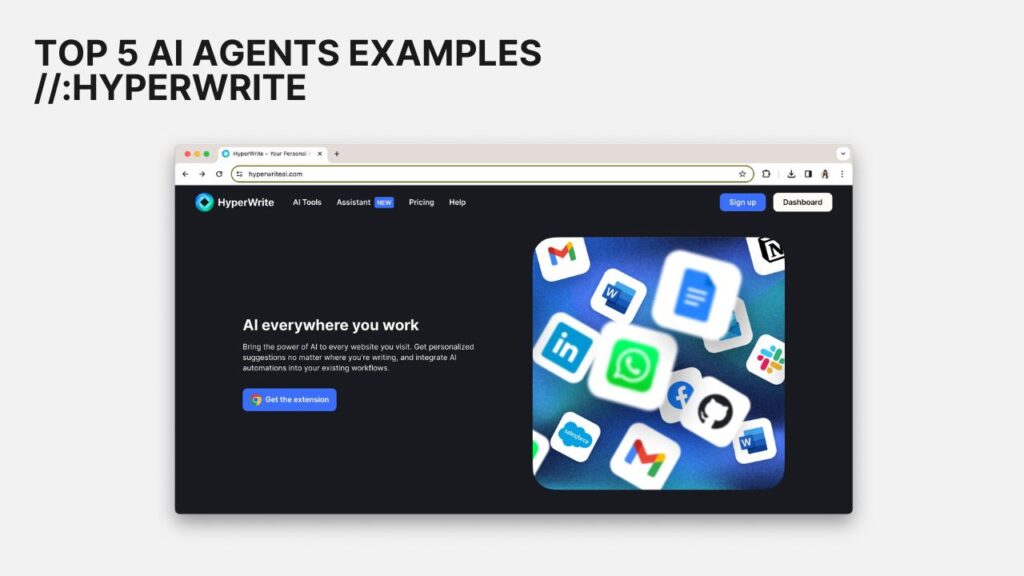
Hyperwrite
Hyperwrite is a versatile AI agent that seamlessly operates through its Chrome extension. This powerful tool empowers users to conduct research effortlessly, streamline email organization, and even interact professionally on LinkedIn. With its browser-centric functionality, Hyperwrite transcends boundaries, allowing users to accomplish a myriad of tasks efficiently and intuitively.
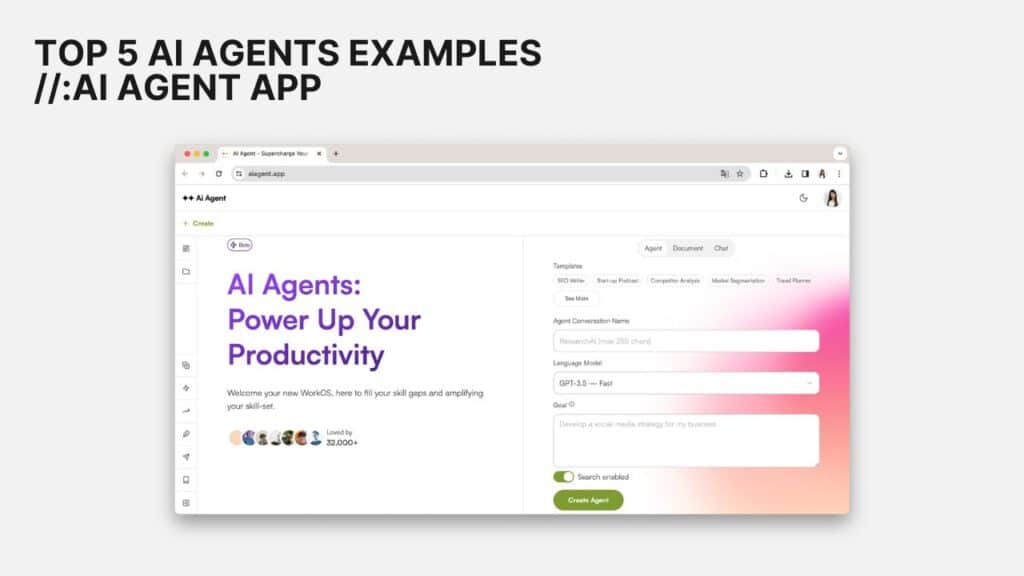
AI agent app
AI agent app is the AI agent app specializes in creating AI agents tailored to diverse tasks. Whether automating research, efficiently managing social media accounts, or crafting personalized workout plans, the platform offers a range of AI solutions to enhance the workflow.
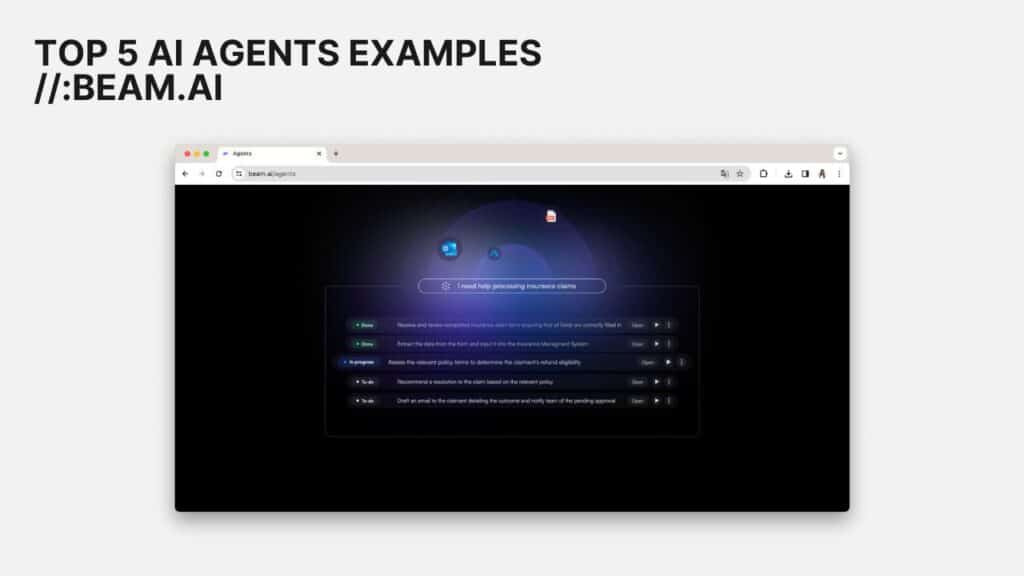
Beam.ai
Beam.ai is a service that delivers a range of AI solutions, but you have to join the waitlist. From improving customer service and optimizing order management to streamlining insurance claim processing, Beam.ai offers tailored solutions. Besides, the platform provides customizable AI solutions to address unique business needs, promising versatility and efficiency in managing diverse processes.
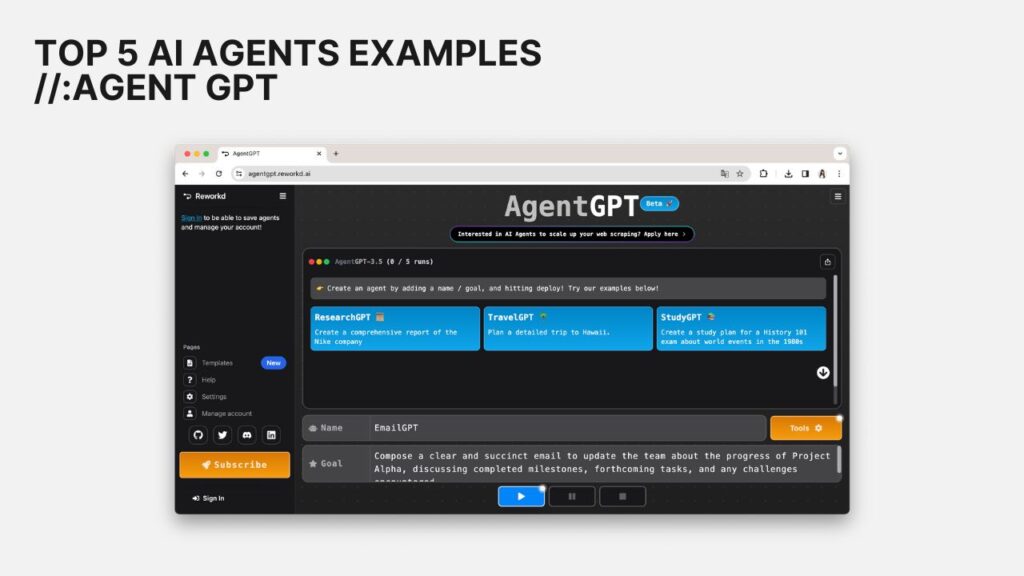
Agent GPT
With AgentGPT, you can set up and launch your own Autonomous AI agents. Personalize your AI by giving it a custom name and watch as it takes on any goal you have in mind. The AI will strategize tasks, carry them out, and learn from the outcomes in pursuing the defined goal.
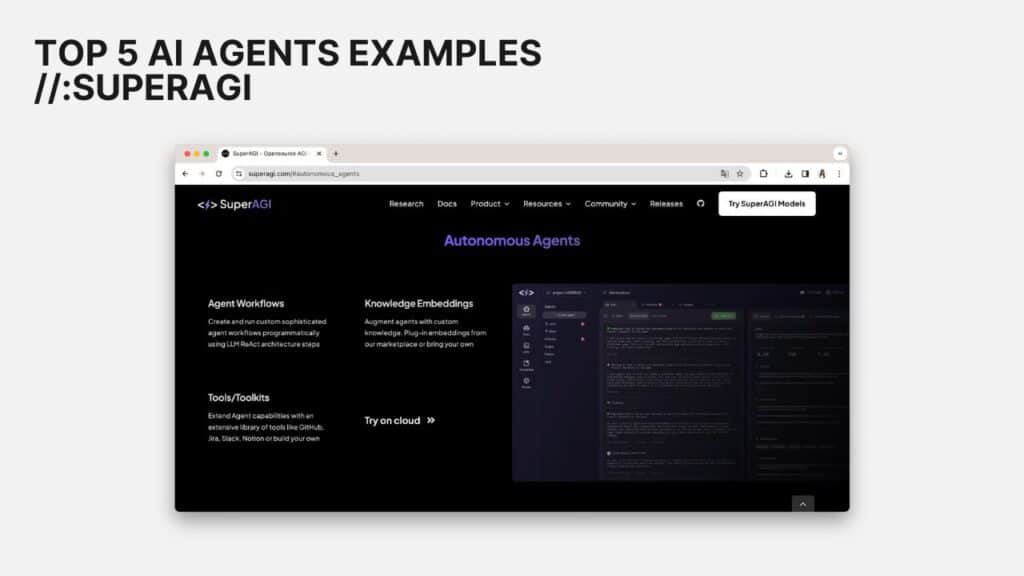
SuperAGI
At SuperAGI, you can leverage a no-code service for constructing AI agents tailored to diverse tasks. The platform is dedicated to building infrastructure components, tools, frameworks, and models that facilitate the development of open-source agentic AGI (Artificial General Intelligence).







